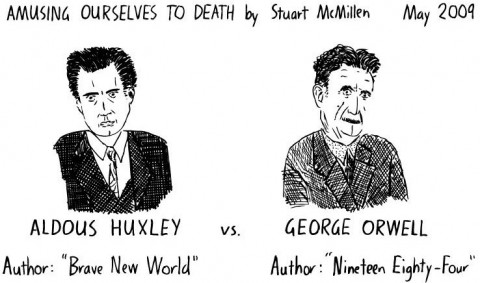Terry Teachout considers the wonders of the printed book and contemplates its looming obsolescence:
Regular readers of this blog know that I believe the printed book to be well on its way to ultimate extinction. As I put it in a “Sightings” column written in 2006, a year before the introduction of the Kindle:
The printed book is a beautiful object, “elegant” in both the aesthetic and mathematical senses of the word, and its invention was a pivotal moment in the history of Western culture. But it is also a technology — a means, not an end. Like all technologies, it has a finite lifespan, and its time is almost up.
On the other hand, I have yet to buy a Kindle, and at the moment I have no plans to do so. This is partly because I prefer to wait until the kinks are ironed out (I’ve never been a truly early adopter) and partly because, like most middle-aged authors, I remain enamored of the sheer physicality of the old-fashioned printed book.
[. . .]
So am I really a closet Luddite, a technological Moses who can’t bring himself to enter the promised land of the e-book? Maybe. Six years ago I declared myself to be “open, at least in theory, to the possibility of abandoning the book-as-art-object.” Now that technology has finally caught up with me, I find myself unexpectedly unwilling to put my money where my mouth is. Yet I believe no less firmly than ever that the printed book is a technology whose time has come and gone. Am I, then, a hypocrite? Or merely a middle-aged man who, like most middle-aged men, is reluctant to put aside the youthful things that remind me of myself when young?
I find myself in the same position as Terry . . . I’m not a leading edge early adopter, but I’ve been eager to “get to the future faster” for most of my life. I still remember Usenet when it was “the internet” as far as most people were concerned. I can’t remember a time when I didn’t consider my email far more important and urgent than “snail mail”, and I was a fan of “telecommuting” back when 2400 baud was “high speed”.
And yet . . . I don’t want to give up the book. I just got back from a book-buying spree in Stratford over the weekend, and don’t plan on buying a Kindle any time soon. I’ve got ebooks on my iPhone, but I consider them “emergency” reading material . . . when I don’t have a physical book to hand.
Am I also a luddite?
I hasten to point out that I no longer own any long-playing records or cassettes, and that I spend more time listening to music on my MacBook and iPod than on my CD player. No doubt the time will also come when I spend more time reading books on a Kindle, or something like it, than reading the handsomely bound volumes shelved in my living room. Not for me the self-conscious posturing of those curmudgeonly poseurs who wail Change and decay in all around I see! at every opportunity.
I had largely gotten out of the habit of listening to music until I got my iPhone last year. Since then, I’ve bought more CDs and MP3s than in the ten years before. I’ve still got a few vinyl LPs and a large collection of cassettes, but they’re just gathering dust.





